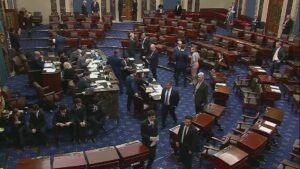Dr. Shagun Bindlish, a diabetologist at One Medical in Dublin, has seen some of her patients forgo insulin purchases in order to cover their household expenses. Bindlish said that co-pays for insulin, which can financially burden diabetes patients, lead some to ration or improperly use the daily drug to make it last longer.
Bindlish is pushing California lawmakers to pass a bill — vetoed by Gov. Gavin Newsom last year — that would cap monthly co-pays for insulin at $35, including for those with private insurance.
Connect and Discover Sale! Subscribe for digital access to local news.ONLY 25¢
The insulin cap bill, by state Sen. Scott Wiener, is one of many making a return appearance during the new legislative session. Lawmakers regularly bring back legislation that did not make it across the finish line for another try at becoming law.
Advertisement
Article continues below this ad
“It’s extremely common,” Wiener said. “It’s very normal when you’re talking about important, impactful public policy for a state of 40 million people.”
But resurrected bills from last session face a number of obstacles that they did not during the last session, including more attention on the special session to prepare for President-elect Donald Trump’s actions and continuing concern about the state’s finances.
During the beginning of the legislative session, Senate President Pro Tem Mike McGuire and Assembly Speaker Robert Rivas both emphasized focusing legislation on financial relief for Californians. Rivas said that while voters in California continue to value protecting reproductive and LGBTQ freedoms, they sent a message that they are unhappy on economic issues.
“They don’t feel that the state of California is working for them,” he said.
Here are more bills that lawmakers have pledged to resurrect in the coming year for another shot at becoming law.
Advertisement
Article continues below this ad
Health
Wiener has also reintroduced another health-related bill that would regulate pharmacy benefit managers, which the legislator described as a middleman between drug manufacturers and pharmacies. The legislation would require all pharmacy benefit managers to be registered with the state’s Department of Insurance, would prevent them from steering patients to affiliated pharmacies, and would limit the amount they can collect from fees.
Assembly Majority Leader Cecilia Aguiar-Curry, D-Winters, resurrected a bill that would provide 14 weeks of paid leave for pregnancy and pregnancy-related health issues for public school teachers. Aguiar-Curry said this effort is particularly important to “eliminate a key reason women leave teaching” amid a school staffing shortage.
The legislation, sponsored by the California Teachers Association, passed the Assembly but died last session in the state Senate.
Housing
Assembly Member Buffy Wicks, D-Oakland, plans to reintroduce legislation to get a housing bond onto the 2026 ballot that would set aside $10 billion for housing construction, similar to the climate and school bond measures voters approved in November.
The legislation, which was introduced last year, would fund affordable housing for rent and for sale. Wicks said the bond would provide necessary money to address the state’s housing shortage.
“We are out of housing money. Out of housing money, period,” Wicks said. “We are in a pretty dire situation for affordable housing funds.”
Wicks also plans to resume work on the select committee on permitting reform to introduce legislation changing permitting practices. She said that long, complicated processes slow and stall development. Wicks said that last session’s hearings before the committee “really opened up Pandora’s box on permitting reform.”
Wicks said that reintroducing legislation and tweaking previously passed bills is a typical part of lawmaking. She said that she plans to introduce changes to her major housing package from 2022, AB2011, like she did during the last session.
“I’m six years in now; I’m sort of legislatively middle-aged,” Wicks said. “I have a better understanding of when you do these big bills, like AB2011, a lot of what comes after that, year after year, is continuing to follow up and clean up. As the law goes out into the wild, you can see how it’s working or not working.”
Artificial intelligence
Legislation seeking to regulate artificial intelligence is also expected to be reintroduced this session. Wiener, whose AI safety bill was vetoed by Newsom in September, plans to reintroduce similar legislation.
Newsom announced a working group on the topic after vetoing Wiener’s bill, but given the legislative calendar, the group is unlikely to give recommendations before Wiener and other lawmakers introduce new bills.
“We have a legislative calendar, and we’re going to stick to it,” Wiener told Politico Playbook. “We’re a co-equal branch. We’ll do our work, and we really look forward to seeing the work product coming from this task force.”
Wicks also plans to reintroduce AI regulation requiring watermarks on images created by generative artificial intelligence. The technology would be required on AI platforms, marking in the metadata of photos that the images were created with AI, to avoid deepfakes and confusion.
“It’s hard to know what is real versus what is fake or generated,” Wicks said.
Reparations
Multiple bills that would have advanced recommendations from the state’s landmark reparations report, published last year, failed this year. Black lawmakers and reparations advocates said in August that they planned to bring back legislation this session.
Assembly Member Lori Wilson, D-Suisun City, the chair of California’s Legislative Black Caucus, said at the time that she has always thought of the process of seeking reparations as a multiyear effort and that some bills will take multiple legislative sessions to get across the finish line.
Former state Sen. Steven Bradford, who authored some of the reparations bills, expressed hope that the failed legislation would be revived under a new author.
“This is an issue that’s still worth fighting for. As I’ve constantly stated throughout this process, we knew it wasn’t going to be a slam dunk, easy thing to do, or we would have done it years ago,” Bradford said in September.
Old and new bills
Wicks also said she expects lawmakers to focus on energy affordability issues and cap-and-trade regulation.
Republican legislators reintroduce their bills regularly, too.
Assembly Minority Leader James Gallagher plans to reintroduce legislation that would require hospitals to allow immediate family members to visit patients, especially in end-of-life situations, known as Dianne’s Law. Gallagher’s bill — which he said was prompted by concerns with isolated hospital patients during the COVID-19 pandemic — passed, but was vetoed by Newsom on Sept. 20.
Assembly Member Tom Lackey, R-Palmdale (Los Angeles County), plans to reintroduce legislation that would establish a voucher program for children’s swim lessons in an attempt to prevent drownings. The legislation died in committee last session.
Wiener’s insulin capping bill, which passed with unanimous support in the legislature before it was vetoed by Newsom, could see pushback from health insurance companies again over its monthly $35 co-pay cap for the millions of Californians with private health insurance.
Bindlish, who also serves as the scientific president and chair of the Northern California chapter of the American Diabetes Association, a supporter of the bill, said that by emphasizing the health impacts, the bill could see a different outcome.
“We all want a better health outcome, better disease management, long-term health care savings and health equity to be balanced,” Bindlish said.
Reach Molly Burke (she/her): molly.burke@hearst.com; Bluesky: @mollyburke.bsky.social
Source: https://www.sfchronicle.com/politics/article/california-bills-19962711.php



